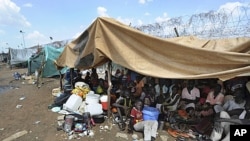After more than two decades of civil war with the North, Southern Sudan is set to become an
independent country on July 9. The fledgling nation will be starting virtually from scratch in enacting policies, programs and institutions. It will be a daunting task, given that few people who lived in Southern Sudan during the war were able to attend school. Southern Sudanese who fled the war and were educated abroad are returning home with knowledge and skills to build the new state. Neighboring Africans are also moving into Southern Sudan.
Technology transfer
William Deng Deng is chairperson of Southern Sudan's Disarmament, Demobilization and Reintegration Commission. As a youngster, he fled the chaos of the civil war, ultimately settling in Toronto, Canada, where he earned two university degrees.
Now he is back in the capital Juba, in charge of retraining and reintegrating former civil war combatants.
"I could have still contributed being in Canada, but it is better I contribute directly right here so that somebody can see that okay, I can leave the nice life of Toronto and come here and be with you," he said.
Deng Deng calls his presence in Southern Sudan a "transfer of technology" - a chance to apply the skills and knowledge he gained in Canada. He says he also sees it as a way of connecting Southern Sudan to the rest of world.
"In other words, it is Canada's contribution directly through a human resource like me, which is taking place. I bring the Canadian knowledge, the Canadian support. And Canada is directly involved through people like myself," he said.
Filling the void
Deng Deng is one of many Southern Sudanese returning to help build the fledgling nation. Very few people who lived in Southern Sudan during the more than 20 years of civil war had the chance to go to school. As a result, there is a vacuum of skilled and educated Southern Sudanese available to set up the necessary programs and services of
the new nation.
Beda Machar Deng, Southern Sudan's Undersecretary of Agriculture and Forestry, who earned his university degree in Britain, said "The Ministry of Agriculture has got priorities. One of the priorities is capacity building, human resource development. We need enough manpower to be trained at the county level, at the state level - in agricultural production also in animal resources."
Much of those human resources are coming from neighboring Kenya and Uganda.
Joe Feeney of the United Nations Development Program says that professionals in African countries - especially those in the region - have a major role to play in helping Southern Sudan set up government structures and institutions to deliver services such as health care.
"Only last week we had 42 Kenyans coming here - 22 of them are medical people - pediatricians, gynecologists, midwives," he said. "They are going to make a difference. They're not going to be working in some big foreign-run center run by NGOs. They are going to be working in the government hospitals and they are going to make a difference."
Career move
Hellen Wairimu is a Kenyan professional working for a Sudanese women's group in Juba. She says that coming to Southern Sudan was a good career move.
"It's easier to get a job in Juba then in Kenya," she said. "In Juba, there are a lot of opportunities. But in Kenya, when you leave a job or you don't have a job, you'll stay for one year, two years, without getting a job. But when I came here, I didn't even finish like two weeks and I landed a job here."
Government ministries in Southern Sudan are working with international donors on training and capacity-building programs. For example, the Ministry of Agriculture and Forestry, and the U.N.'s Food and Agriculture Organization have implemented computer system that monitors food production, market prices, weather patterns. Several Southern Sudanese within the ministry were selected to be trained on how to gather and analyze this information, which will be important in forming the country's agricultural policy.
In his role as chairperson of the Southern Sudan Disarmament, Demobilization and Reintegration Commission, William Deng Deng is training ex-combatants to run projects in fisheries, forestry, agriculture and construction. He says that attracting investment to the new country will be crucial to job creation.
Human Resources Key to Southern Sudan's Success




